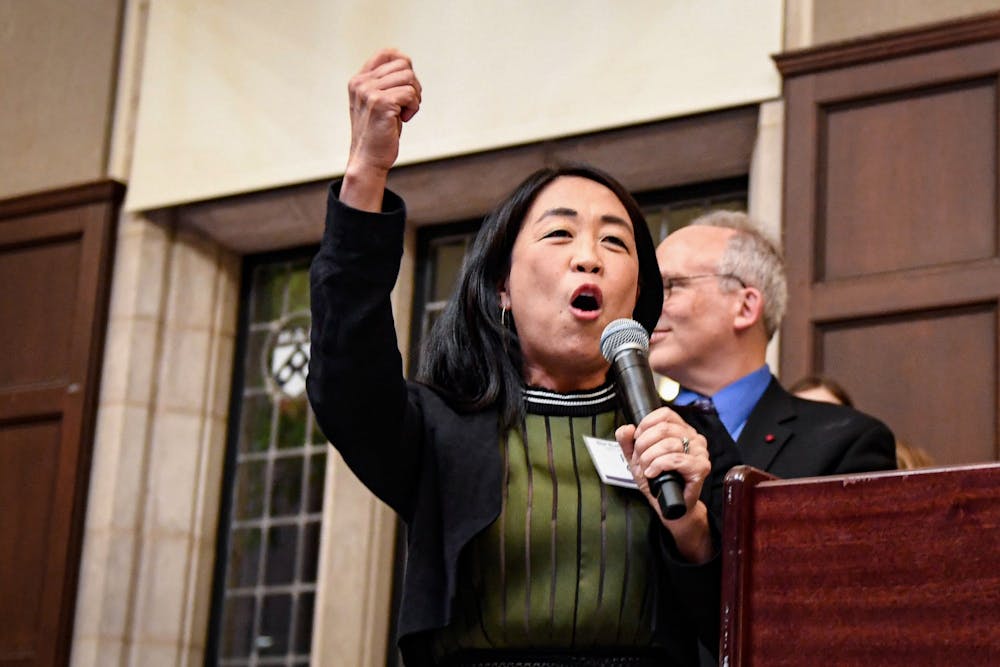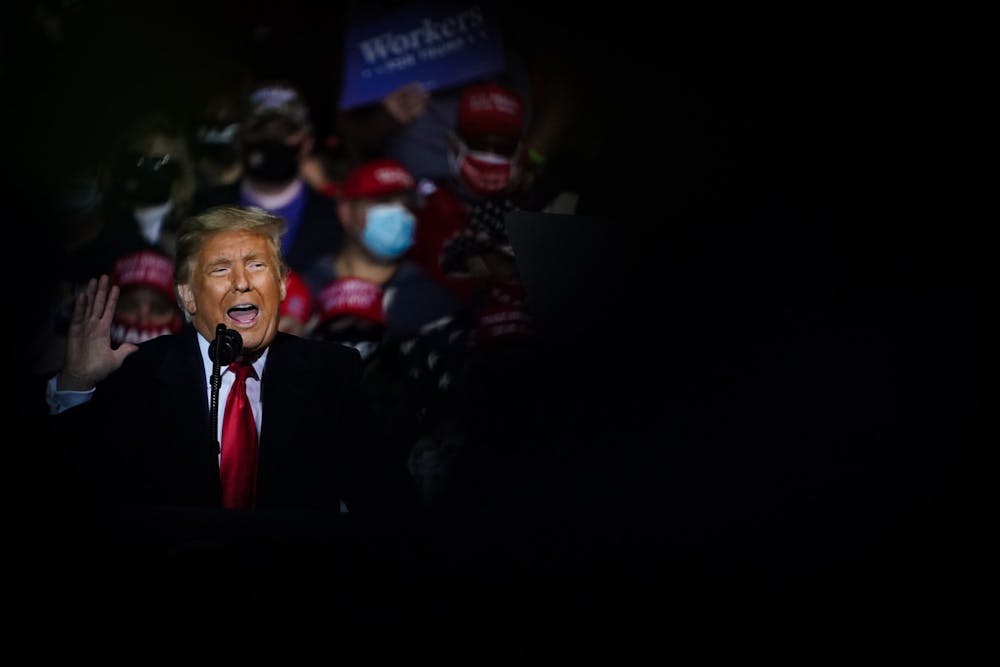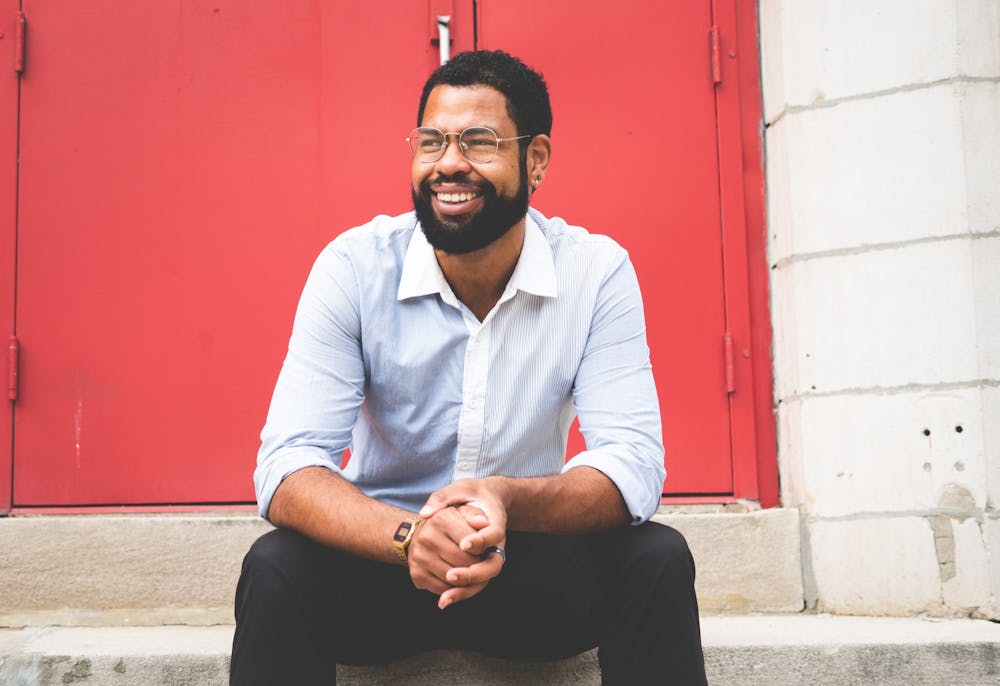Against the backdrop of Pennsylvania's growing importance in determining next week's election, voting rights experts at Penn, Philadelphia politicians, and student political advocates are concerned about efforts to suppress the votes of Black, Latinx, immigrant, and working-class communities.
President and 1968 Wharton graduate Donald Trump has pulled out all the stops in an attempt to undermine the Nov. 3 election results. Philadelphia, where registered Democrats outnumber Republicans seven to one, appears to be his focal point.
Trump urged his supporters to monitor the polls on Election Day because he claimed at the first presidential debate that "bad things happen in Philadelphia." Days after the debate, the Trump administration sued the City of Philadelphia for preventing campaign representatives from watching people register or vote in satellite election offices.
In the past month, he used an election worker's mistake discarding nine military ballots in Pennsylvania's Republican-controlled Luzerne County as fodder for his false claim that mail-in ballots are fraudulent. Pennsylvania Republicans filed a second appeal with the United States Supreme Court on Oct. 23 to overturn the state's mail ballot deadline extension, after the nation’s highest court had denied an earlier appeal on Oct. 19.
For Penn-affiliated politics aficionados, all of these tactics are today's manifestations of a country with a sordid history of voter disenfranchisement.
"In just the last 20 years, from the Bush v. Gore decision, to Citizens United, to the gutting of the Voting Rights Act of 1965, to the refusal to enact common sense immigration reforms, we have seen a dramatic erosion of voting rights in the United States," Philadelphia Councilmember and 1993 College graduate Helen Gym wrote in an email to The Daily Pennsylvanian. "You don’t need to reach back into the 19th century to see Black, Brown, and immigrant voters being denied the right to vote. You can see it unfold before us. When a smaller and smaller electorate speaks for a nation largely disenfranchised, our politics will be at odds with politicians who struggle to meet this moment."

A history of voter suppression
Next Tuesday marks just the second presidential election since Shelby County v. Holder, a 2013 case where the Supreme Court struck down Section 4(b) of the Voting Rights Act of 1965 in a 5-4 decision. The ruling stated that states with deep-rooted histories of voting discrimination, like Alabama, South Carolina, and Texas, no longer needed the federal government to approve voting changes.
The aftermath resulted in 14 states establishing new voting restrictions ahead of the 2016 election without federal government approval, ranging from laws that complicate voter registration and reduce early voting, to those that require forms of identification that millions of Americans — and disproportionately those of color — do not possess. In some states, such restrictions made it easier for one to buy a gun than vote.
For historians and voting rights experts, the ruling marks a regression in the fight for civil rights, reminiscent of the post-Reconstruction era when the country's history of disenfranchising African Americans' right to vote began. While federal laws granted African Americans some civil rights during the Reconstruction era in the mid to late 1800s, the decline of the Southern economy and the newly Democrat-controlled Southern legislatures in the 1870s led to a rise in voter intimidation tactics designed to suppress Black voters — an era known as Jim Crow.
Although Pennsylvania was not one of the states that implemented stricter voting laws in 2016, the commonwealth has its own complicated history with voting accessibility.
Black civil rights activist Octavius Catto worked tirelessly to get Pennsylvania to ratify the 15th Amendment in the mid-19th century, according to Gideon Cohn-Postar, a postdoctoral fellow at Penn's Andrea Mitchell Center for the Study of Democracy. Catto's statue at City Hall was the city's first to commemorate a person of African American descent.
But the advancement and fight for civil rights coincided with increased voter intimidation and violence perpetrated by Democrats who did not want African Americans to vote for Republicans. The tension culminated in the murder of 32-year-old Catto by a Democratic Party supporter on Oct. 10, 1871 — the first election day African Americans were allowed to vote.
Only when Gov. Tom Wolf signed Pa. Act 77 of 2019 into law last October was there a loosening of restrictive voting measures in Pennsylvania, Cohn-Postar said. The bill allowed registered Pennsylvania voters to cast their ballot from home and submit their ballot up until 8 p.m. on the day of the election. The law does not require voters to provide a justification for being unable to physically go to a polling center.
"For most of the 20th and 21st century, Pennsylvanians had to vote on Election Day, and often that means having to take time off work, and that can disproportionately affect wage-working people, which are disproportionately people of color," Cohn-Postar said. "So the shift to allowing non-excuse absentee balloting recently is a big advance towards increasing African American access to the polls."

Some are concerned about President Trump's tactics that incite fear and distrust of the voting system among American voters.
Concerns about the Trump campaign and its threat to democracy
Cohn-Postar still expressed concerns about voter disenfranchisement in the upcoming election. His main worry is the impact of Trump's threats about the presence of poll watchers on voters, particularly voters of color.
"Trump simply making the comment that people should go and watch the polls is inherently intimidation and could decrease people going to the polls," he said. "We don't know who these people Trump is calling are, how they will act, [or] what the police response will be if people attempt to intimidate or suppress voters. So it's on two levels: the rhetorical level which could suppress voters and then the real potential violence."
Both Cohn-Postar and Penn Democrats Vice President and College sophomore Emilia Onuonga, who is a former DP staffer, said that Trump's efforts to undermine mail-in voting are dangerous to democracy.
"I think that the current president is trying to undermine the legitimacy of the election," Onuonga said. "He is encouraging voter intimidation, which is voter suppression."
For Penn Justice Democrats Co-leader and College junior Jack Cahill, voter suppression is especially pertinent in this election largely as a result of Trump's tactics to incite fear and distrust of the voting system among American voters.
"We have an authoritarian president who it seems will not stop at anything to prevent minorities and other Democratic-affiliated groups from voting to ensure that he remains in power," he said.
Cahill's fear stems from a recent article in The Atlantic, which reported the Trump campaign was making contingency plans to bypass election results by pressuring state legislators into choosing electors directly, if the vote count remains unclear by the "safe harbor" deadline of Dec. 8. Cahill called this potential move by the Trump administration "an end to democracy."
Today's manifestations of voter disenfranchisement, exacerbated by COVID-19
Experts said one of the most prevalent examples of voter disenfranchisement is the fact that Election Day is not a federal holiday.
"For many people, particularly if they're reliant on their work and are paid hourly wages and can't take the time off, voting on any Tuesday in November is difficult," said Michael Jones-Correa, the President’s Distinguished Professor of Political Science and director of Penn's Center for the Study of Race, Ethnicity and Immigration. "It is particularly difficult with the pandemic, and minority and immigrant voters have been the hardest hit by the pandemic."
He added that while Pennsylvania and other states have worked to make the voting process easier by implementing online registration in 2015 and adding satellite election offices for early voting, obstacles such as language barriers and lack of internet access serve as a form of disenfranchisement.
For Penn Asian American Pacific Islander Politics director and College junior Amira Chowdhury, who is also a leader of Penn Justice Democrats, the language barrier to voting is personal. She detailed her role as her family's translator since they immigrated from Bangladesh.
"Over the phone, I translated my dad's [and mom's] ballots as they filled it out, and I had to read it out line by line," she said. "The general election ballot did not come in Bengali. The general election ballot did not come in Arabic or Hindi or Farsi; and so there are just all of these different mechanisms that political leaders purposely make sure continue to perpetuate and maintain disenfranchisement to their political benefit."

The Human Rights Watch found that in both Philadelphia and Pennsylvania, polling place consolidations likely kept people of color from voting because of their preference to vote in person.
Pennsylvania has not been in the headlines to the extent of other states like Georgia with regard to overcrowded voting locations due to polling place closures and an influx of new voters since 2016. Political Science professor Marc Meredith noted, however, that both Philadelphia and Allegheny counties closed down many polling locations during the Pennsylvania primary to encourage more people to vote by mail because of the pandemic.
A recent report by Human Rights Watch found that in both Philadelphia and elsewhere in Pennsylvania, polling place consolidations likely kept many people, particularly people of color, from voting because of their preference to vote in person.
Toorjo Ghose, a professor at the School of Social Policy & Practice, echoed Meredith's points, adding that systemic disenfranchisement especially targets people who are incarcerated and cannot vote in person.
"All of the challenges to mailing in and having your vote count this year are really amplified to the one group that actually has only the mail-in ballot as their recourse to voting, and that's folks who are in prison," he said, noting that Philadelphia has the highest incarceration rate of metropolises in the country. "If you're in prison awaiting trial or on a misdemeanor, then you can't vote outside of mailing in your vote. And if you're going to have that challenge, then of course, that's a very systematic form of disenfranchisement, especially of African Americans, who are incarcerated at such high rates."
Ghose also mentioned a less systematic form of disenfranchisement that he says is especially prevalent in this election: Providing Black communities and other communities of color with presidential candidates that do not reflect their communities' best interests.
"Sure you have the right to go to the polls to vote, but if you're not given the choice of [presidential candidate] that really is for your community, that is a form of systematically saying that really, your [votes] don't count," he said. "Your [votes] count only so far as: voting for the lesser of two evils is going to make us as middle class people happier."
College senior and President of Penn's Black Student League Kristen Ukeomah cited the candidates' platforms and voting roadblocks as reasons she does not think it is fair to criticize Black people and other disenfranchised groups for not voting.
"Rationally, it would make sense that if you don't vote in an election, or if you didn't try to make an impact or influence the way the election turned out, you can't be mad about how the election turned out," she said. "But I think it's ridiculous and unfair and I think deeply problematic that our candidates are advocating to dismantle a lot of basic human rights, and that people are being blamed for not going out to vote. We're not going to blame the individual for the fault of the system."
She alluded to the younger Black electorate who, amid protests against police brutality and systemic racism, and the government's response to the COVID-19 pandemic, have lost faith in a system that has done little for the Black community.
Looking beyond Nov. 3
Ukeomah clarified that although she believes nothing radical will come out of the presidential election even if Biden were to replace Trump in office, she still finds great importance in voting in the election, particularly on the local level.
"You're not just voting for the president in these elections. You're voting for your local congresspeople, your state representatives, your councilmembers, and those largely impact your day-to-day life," she said. "The infrastructure of cities and funding for public schools are largely impacted by elected officials other than the federal government, and those are things we should be involved in too."

Democratic nominee for PA House District 188 and 2013 Engineering graduate Rick Krajewski. (Photo from Jason Lozado)
Rick Krajewski, 2013 Engineering graduate and Democratic nominee for Pennsylvania's House District 188 representing West and Southwest Philadelphia, said that because Pennsylvania is a battleground state, every vote matters in the presidential election. He also urged voters to remember the importance of local elections.
"There needs to be a clearer understanding of how our issues connect to local elections," he said. "It's up to us to start to do that kind of education so people know, and I think that's going to increase voter participation from the municipal level all the way up to the federal level."
Krajewski said he feels confident in city leadership, and looks forward to working out the kinks in mail-in voting for future elections to enfranchise more communities.
"I think we're trying our hardest to push back against voter suppression here in [Philadelphia]," Krajewski said. "This whole thing has been a learning process for us around voting by mail, around voting by mail in a pandemic, around early voting, and I just hope that we take this year as a big learning lesson and do it better next year, because I do believe if we do this all right, if it's implemented correctly, it can actually be a process that promotes democracy."
For Gym and many other social justice advocates, the fight does not end next Tuesday.
"Vote Nov. 3 and keep staying active," she wrote to the DP. "On Nov. 4, there is more than enough work for all of us to do. We’ve got a world to build!"
The Daily Pennsylvanian is an independent, student-run newspaper. Please consider making a donation to support the coverage that shapes the University. Your generosity ensures a future of strong journalism at Penn.
Donate





Most Read
More Like This